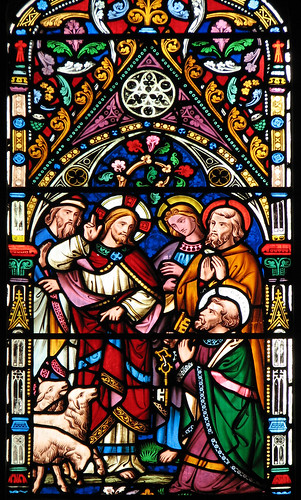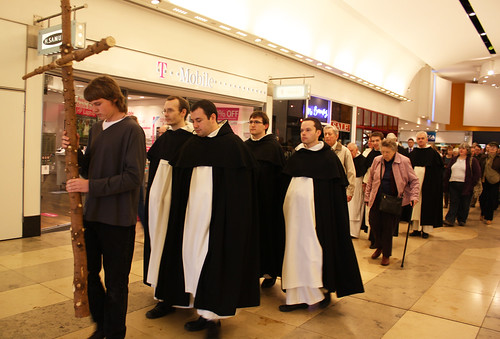However, I am reminded of something my brother, Timothy Radcliffe OP has said: that the corporate business model is not helpful in understanding issues concerning charity and communion. One also recalls those apostles like Simon the Zealot or Judas Iscariot who misinterpreted Jesus' presence among them and regarded his saving actions in terms of power, politics, and pecuniary gain. So, perhaps we ought not to be too swift to blame those today who still do not understand what the Church, Christ's Body, is about. But at least the Vicar of Christ, Pope Benedict, stands in good company with his Master.

For it is the Master's mission of unity, given to his servant St Peter, that Pope Benedict is acutely aware of having taken on. In his first message to the Cardinal-Electors on the day of his election on 20 April 2005, he said: "With full awareness, therefore, at the beginning of his ministry in the Church of Rome which Peter bathed in his blood, Peter's current Successor takes on as his primary task the duty to work tirelessly to rebuild the full and visible unity of all Christ's followers. This is his ambition, his impelling duty. He is aware that good intentions do not suffice for this. Concrete gestures that enter hearts and stir consciences are essential, inspiring in everyone that inner conversion that is the prerequisite for all ecumenical progress."
What is Joseph Ratzinger's attitude towards ecumenism? In 1995 he said: "Divisions within the Church... consist of a split in the confession of faith, the creed, and in the administration of the sacraments themselves; all other differences do not ultimately count: there can be no objection to them; they do not divide us in the heart of the Church. Division within that central sphere, on the other hand, threatens the real reason for the Church's existence, her very being... [Therefore] a tolerance for different things had to be aroused, not founded on indifference concerning the truth, but on the distinction between truth and mere human tradition."
With this in mind, we have seen this pope take remarkable steps, but often with much criticism both from within and without the Catholic Church, to restore the full and visible unity of the Church, which (as Vatican II teaches) is "in Christ like a sacrament or as a sign and instrument both of a very closely knit union with God and of the unity of the whole human race". This is not just some spiritual unity then, but it is concrete and real, so that one can point to a community gathered together around the Lord and his servant of unity, and say that there is found Christ's one, holy, catholic and apostolic Church. For again, as Vatican II said, "division [among Christians, by which each group differs in mind and goes their separate ways] openly contradicts the will of Christ, scandalizes the world, and damages the holy cause of preaching the Gospel to every creature." It is this scandal of division that the Pope, as a true pastor and servant of unity, seeks to heal. As he said in another context, namely, his letter to the Catholic bishops when he issued his motu proprio 'Summorum Pontificum', which was directed to healing the rift with Catholic 'traditionalist' groups: "Looking back over the past, to the divisions which in the course of the centuries have rent the Body of Christ, one continually has the impression that, at critical moments when divisions were coming about, not enough was done by the Church’s leaders to maintain or regain reconciliation and unity. One has the impression that omissions on the part of the Church have had their share of blame for the fact that these divisions were able to harden. This glance at the past imposes an obligation on us today: to make every effort to enable all those who truly desire unity to remain in that unity or to attain it anew."
 The Holy Father is entirely consistent and obedient to the mission given to him by God in making every effort to reach out to those who seek unity with him as the Church's central sign of unity. Moreover, it needs to be noted that in the current case, it was certain Anglican groups who had first reached out and asked the Pope to help them to achieve corporate unity with the Catholic Church. Thus, he was responding to their needs, and by no means 'poaching' or taking advantage of the Anglican communion's embattled and tested unity. Joseph Ratzinger is well-known, even among those who do not like him, as someone who listens carefully, intelligently and attentively to the points made to him by his interlocutors. As such, he presents to us a model of dialogue, for he is clear about his own position, listens fairly to the positions and needs of his dialogue partners, and does the utmost to meet their requests and to be accommodating without damaging his own position. His own position, incidentally, is not one that he fashions in his own image, but rather one which he receives from Scripture and Tradition, so that, as his motto puts it, he may be a co-worker with the Truth, who is Jesus Christ.
The Holy Father is entirely consistent and obedient to the mission given to him by God in making every effort to reach out to those who seek unity with him as the Church's central sign of unity. Moreover, it needs to be noted that in the current case, it was certain Anglican groups who had first reached out and asked the Pope to help them to achieve corporate unity with the Catholic Church. Thus, he was responding to their needs, and by no means 'poaching' or taking advantage of the Anglican communion's embattled and tested unity. Joseph Ratzinger is well-known, even among those who do not like him, as someone who listens carefully, intelligently and attentively to the points made to him by his interlocutors. As such, he presents to us a model of dialogue, for he is clear about his own position, listens fairly to the positions and needs of his dialogue partners, and does the utmost to meet their requests and to be accommodating without damaging his own position. His own position, incidentally, is not one that he fashions in his own image, but rather one which he receives from Scripture and Tradition, so that, as his motto puts it, he may be a co-worker with the Truth, who is Jesus Christ.Putting Christ at the centre of our concerns and goals is the way to advance in ecumenism, and this requires change for all Christians. As Vatican II said: "There can be no ecumenism worthy of the name without a change of heart. All the faithful should remember that the more effort they make to live holier lives according to the Gospel, the better will they further Christian unity and put it into practice." The complaint made by those who seek union with the Catholic Church is that other ecclesial communities have strayed further from the Gospel and the Tradition which comes to us from the apostles. If this is so, then they are right to follow their consciences and to seek unity with the successor of St Peter who is the Rock on which the Catholic faith is built. In doing so, one expects that they are seeking to live holier lives, to come closer to Christ and the Ecclesial unity he desired, and they are taking practical steps in securing that unity.
 With this in mind, we can hopefully see why talk of power, or Fr Küng's cynical retort that the pope is trying to "fill up the dwindling ranks of the Catholic church" is woefully mistaken. It also shows how they, like the apostles before the Resurrection, seem to misunderstand Christ's (and His Church's) purpose and mission. For the pope is not interested in power, statistics, or the religious market-share. He is interested in the truth, in the good of humanity that can be found through a living faith in Jesus Christ who alone can free the world from division, hatred, selfishness, sin and error, which is what the "dictatorship of relativism" ultimately gives us. So, as St Paul said, "we preach Christ crucified, a stumbling block to Jews and folly to Gentiles, but to those who are called, both Jews and Greeks, Christ the power of God and the wisdom of God". The power of the Cross and the power of the Gospel of Christ to transform sinful human lives, grabbing souls from the devil, then, is what Pope Benedict XVI is about.
With this in mind, we can hopefully see why talk of power, or Fr Küng's cynical retort that the pope is trying to "fill up the dwindling ranks of the Catholic church" is woefully mistaken. It also shows how they, like the apostles before the Resurrection, seem to misunderstand Christ's (and His Church's) purpose and mission. For the pope is not interested in power, statistics, or the religious market-share. He is interested in the truth, in the good of humanity that can be found through a living faith in Jesus Christ who alone can free the world from division, hatred, selfishness, sin and error, which is what the "dictatorship of relativism" ultimately gives us. So, as St Paul said, "we preach Christ crucified, a stumbling block to Jews and folly to Gentiles, but to those who are called, both Jews and Greeks, Christ the power of God and the wisdom of God". The power of the Cross and the power of the Gospel of Christ to transform sinful human lives, grabbing souls from the devil, then, is what Pope Benedict XVI is about.Let us pray for the Holy Father, and also for ourselves that we may also be co-workers with the Truth: "Lord, remember your promise. Grant that we may be one flock and one shepherd! Do not allow your net to be torn, help us to be servants of unity!" (from the Inauguration Mass of Pope Benedict XVI, 24 April 2005).
As you say, there are too many who see the Holy Father's response to those Anglicans who have approached him seeking reunion in terms of power and control.
ReplyDeleteAm I alone in being reminded by this attitude of the famous misconception of Joe Stalin, with his (in)famous question 'How many divisions has the Pope ?'
We are incredibly fortunate to have a Holy Father who lives up to the name so fearlessly; and is truly a father to all, including our 'separated brethren'.
Would that all those who criticise him for this could show as much toleration, sympathy, and indeed love for all God's children, and understanding of their genuine needs and concerns.
There are people in the Church of England who feel unsettled at the moment and Pope Benedict has changed the senario for them from one of rejection to one of welcome, which I think helps everyone in the Church of England approach the future with a positive sense of responding to God's call. I am an Anglican but God very often speaks to me of his love through your work here.
ReplyDelete